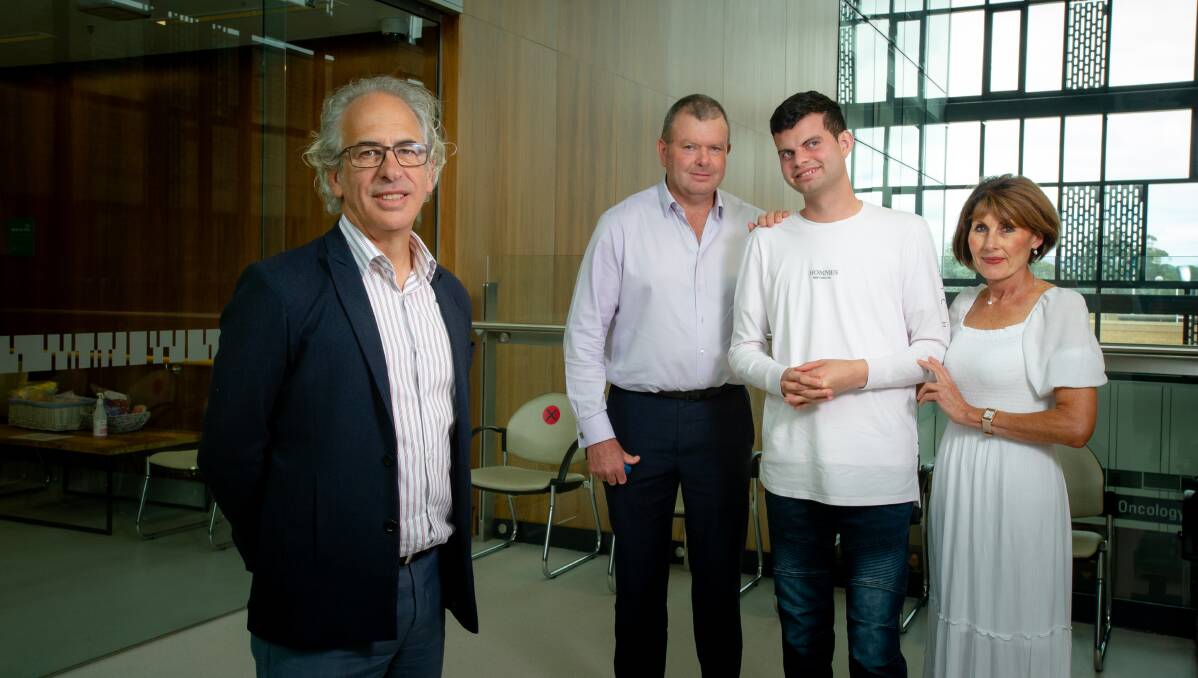
Within 30 seconds of Nick Townsend being born, everyone knew he was a little bit different.
Subscribe now for unlimited access.
$0/
(min cost $0)
or signup to continue reading
His father Vince Townsend said doctors first spotted his clubfoot; later, they noticed his ears were a bit lower than average, and joked Nick probably got that from his dad.
Nick was assessed by geneticists when he was a child, but they couldn't pinpoint any specific cause for his characteristics.
Ultimately, they decided Nick should fall under an umbrella term "developmentally delayed"; later, that changed to "intellectual disability".
"It was a bit vague," Vince Townsend said.
By 2018, the Townsend family - Nick, aged 22 - was used to not having answers.
Then Nick was referred to Canberra Clinical Genomics and got one: Skraban-Deardorff syndrome.
Nick's mother Tanya Townsend said they were grateful for the diagnosis, given it led them to find out the syndrome wasn't hereditary.
It also meant she could start researching the syndrome on her own and get a sense of shared experience - even from somewhere as far away as Philadelphia in the United States.
"I read about 34 cases in Philadelphia; they were all so similar with the characteristics, it was amazing," Ms Townsend said.
"They had a happy disposition [and were] very social.
"Nick had every one of the characteristics, with the exception of seizures."
Professor Matthew Cook, the director of Canberra Clinical Genomics, explained that before genomics, geneticists had to try and make educated guesses about which of the 20,000 genes should be tested to explain a condition such as Nick's.
"Now with whole exome sequencing, we can sequence all 20,000 genes, [which] means it reduces the guesswork and increases the likelihood that we'll identify that variant [in a gene that is responsible for a diagnosis]," he said.
The state-of-the-art technology has been around for a little while, but it is a first for the ACT.
The territory is also in a somewhat unique position in that everyone who needs it can access it, and the significant expense isn't an issue.
"This is a publicly funded service, so there is no cost incurred by the patient, and that's because of the support from [Canberra Health Services]," Professor Cook said.
"I think sometimes we're a little bit down on Canberra as a place but I think this illustrates that here we've got an aspect of our healthcare that's operating at the cutting edge."
Canberra Clinical Genomics was set up with help from the Australian National University in 2017, and secured funding from Canberra Health Services soon after that.
The health service recently agreed to fund the genomics clinic for another five years, until 2025. The agreement came ahead of World Rare Diseases Day on February 28.
These days, Nick is a 24-year-old rugby union fanatic whose personal highlights include converting a try for the Queanbeyan Whites after he got the go-ahead from coach Sam French.
Vince Townsend said: "He is who he is and you wouldn't actually change it.
"We're pretty lucky in a lot of ways because you don't have too many 24-year-olds that don't cause any trouble."
READ MORE:
Nick's family hoped his diagnosis would steer him in the direction of more opportunities and more tailored support.
His sister Elizabeth Townsend said: "I think it will comfort a lot more people in the future if there's a diagnosis from the start.
"Mum and dad have sort of had to find out as they've gone along."
Our journalists work hard to provide local, up-to-date news to the community. This is how you can continue to access our trusted content:
- Bookmark canberratimes.com.au
- Download our app
- Make sure you are signed up for our breaking and regular headlines newsletters
- Follow us on Twitter
- Follow us on Instagram


